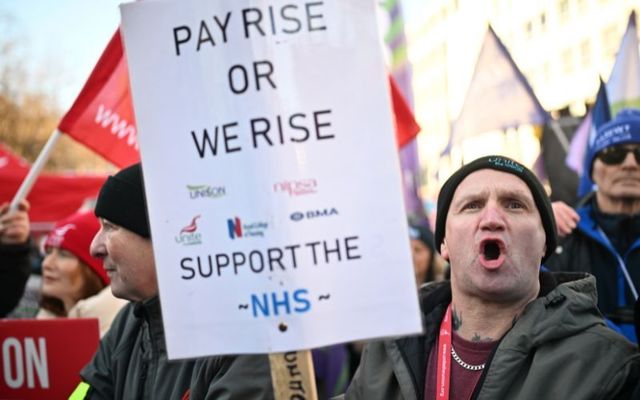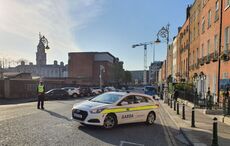Tens of thousands of striking workers gathered at rallies in Belfast, Derry, Enniskillen, Ballymena, Omagh, Magherafelt, and Cookstown on Thursday, January 18.
An estimated 150,000 public sector workers organized the massive strike, demanding pay parity with their counterparts in other areas of the UK.
Chris Heaton-Harris, Northern Ireland's Secretary of State, reiterated on Thursday that the British Government has offered "a fair and generous package worth over £3bn which would address public sector pay and provides more than £1bn to stabilise public services."
The package, however, is contingent on "ministers being back to work in Stormont."
Northern Ireland has been without a functioning government since February 2022 when the Democratic Unionist Party (DUP) pulled out of power-sharing in protest of some Brexit arrangements. The party has refused to re-enter power-sharing ever since.
The day before Thursday's strike, the Northern Ireland Assembly was recalled on foot of a successful petition by Sinn Féin that sought to elect a Speaker and Deputy Speakers, to appoint a First Minister and Deputy First Minister, and to debate a motion regarding fair pay settlements for public sector workers.
However, nominations to elect Mike Nesbitt of the Ulster Unionist Party (UUP) or Patsy McGlone of the Social Democratic and Labour Party (SDLP) to the role of Speaker failed to get the support of the Democratic Unionist Party (DUP), forcing Wednesday's session to be suspended.
It was the seventh time the Assembly met and failed to break the stalemate.
“If Jeffrey Donaldson [head of the DUP] does not change his approach, then this sitting may well be the final one of this Assembly," Sinn Féin's Michelle O'Neill, First Minister-designate, warned on Wednesday.
“I fear that the democratic institutions of the Good Friday Agreement are in freefall.
"While this is reprehensible, those are the hard facts before us."
According to BBC, 16 unions took part in Thursday’s strike: British Dietetic Association (BDA), Charted Society of Physiotherapists (CSP), GMB, Irish National Teachers' Organisation (INTO), Society of Radiographers (SoR), Siptu, National Association of Headteachers (NAHT), National Association of Schoolteachers and Union of Women Teachers (NASUWT), National Education Union (NEU), Nipsa, Royal College of Midwives (RCM), Royal College of Nursing (RCN), Ulster Teachers Union (UTU), Unison, Unite, and University and College Union (UCU).
"This is a campaign we will continue, this is a campaign we will win," Gerry Murphy, Assistant General Secretary of the Irish Congress of Trade Unions (ICTU), told the rally in a cold Belfast on Thursday.
The Northern Ireland Committee of ICTU described the mood of the crowd in Belfast as "defiant and buoyant."
The mood in the crowd is defiant and buoyant #J18 pic.twitter.com/WMzLT5I5Q4
— NIC ICTU (@NIC_ICTU) January 18, 2024
With so many public sector workers on strike on Thursday, many services were disrupted for the day. Translink said none of its bus and train services would be running, the Department of Health advised the public of a "significantly reduced health service" for the day, and the Education Authority anticipated “widespread disruption to education.”
Additionally, the Department for Infrastructure advised that road workers will remain on strike until Thursday, January 25, “which significantly restricts the volume of gritting that can be carried out from the 19-24 January and disruption should be expected until warmer weather arrives.”
Thursday's strikes coincided with the deadline for the restoration of power-sharing in Stormont, meaning Heaton-Harris falls under a legal duty to call an early assembly election, though he can delay the call. He said in Parliament on Wednesday that bring forward legislation "on these matters" next week.




Comments